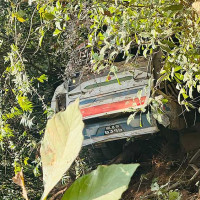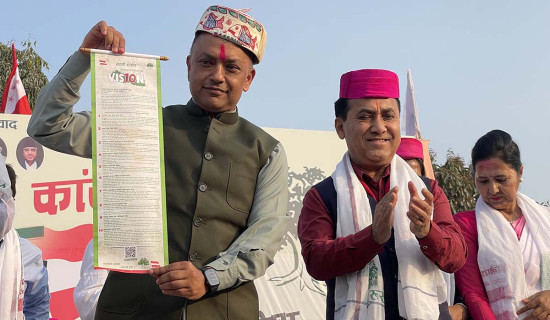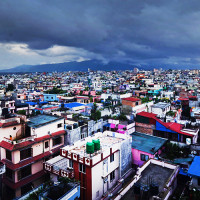- Thursday, 19 February 2026
Nurturing Enlightened Cultural Roots
Civil society manifests a civilised disposition of people. It is organised to perform worthy initiatives and promote public interest in matters of education, health, relief, charity and small-scale project works. Civility is the source of culture nourished by the virtues of the satto guna of civil society. It aims to transform a pre-rational tribal society into rational citizens and human beings. Nepal’s ancient core of its statehood is rooted in its culture, art, music, religion, literature, sacred books, theatre, rituals, temples and festivals and performance of historical drama to animate the ideal potential of cooperative life.
Nepali culture has created norms and values for socialisation of people into an enlightened public to perform niskam karma (selfless service), the very virtue of its civil society. They are evolved to satisfy heart and soul by acquiring atma gyan (inner vigilance) so that one does not become a stranger to oneself but perfects the self and harnesses social energy for entrepreneurship beyond biological appetite. Free will requires reflection of conscious existence, aham asmi, the resonance of existentialism. It presupposes corresponding responsibility.
Public-spiritedness
Nepali culture is transmitted across many generations through family, community, society, state, holy sites, schools and cultural industries, enabling people to freely associate with it. The spirit of people is the basis of its culture and its gist to heal empirical divides. Public-spiritedness of its civil society is accepted by a large section of Nepalis even during the pre-state phase. The enlightenment tradition of Nepal evolved by Vedas, Janak and Buddha embodies spiritual, ritual and rational insights to produce awakened humans. It is stuffed by the self-critical rationality of Shastrartartha.
Organic civil society has shored up the belief that personal good is linked with the good of the Nepali state and people. It differs from the Western Enlightenment. The former relies on an organic view of life, social cohesion and solidarity and reconciles faith, feeling and reason, while the latter believes in individual autonomy, natural rights and scientific reason. They have common points as well: both hold the dignity of human life.
Nepali cultural historians have evolved several mythologies about the nation’s name, its evolution, language, flag, knowledge and institutions, livened up by pagoda arts, crafts, paintings, poems, songs and dramas to realise the ultimate meaning of life. Culture liberates human beings from their biological clutch of instinct and orientations to norm-governed conduct, breathing their social nature, not Hobbesian. Civil society provided people with cultural memory, contextual insights and a future to get along and cooperate on shared values and issues and meet people’s needs, wants and aspirations for progress.
Culturally imbued, many organic civil societies of Nepal are the foundation of its nationhood. They nourish the nation’s philosophical awareness of the cosmic web of life, where each living species is connected to the other for their survival and growth. This view has promoted an ethical and cultured life of people; a life lived in a civilized sphere. The art of civic associations of the Buddhist Sangha and the Hindus’ Sat Sanga denotes the lineage of civil society. They link isolated and desolate lives and discover common values for shared destiny.
Civil society’s moral culture can grow if it internalises the spirit of sociability and humanity and generates a common zone of sentiment for all Nepalis so that they do not have to live in cold utilitarian calculation of politics, market’s atomizing yen or parochialism of tribal associations built on the theory of exclusion of the other. Nepalis have habitually internalised the nation’s diverse cultural and sub-cultural traits without any sense of prejudice and an indigenised rationalistic ethos of modernity, democracy, human rights, market economy, justice, etc., stretching its knowledge and science boundaries.
In a diverse society like Nepal with 125 caste and ethnic groups, 123 languages and dialects and over 150 religious cults scattered over its layered topographical zones, it is not unnatural to find certain linguistic and cultural variations and formation of distinct sub-cultures in dress, foods, practice of rituals, occupation and trade. The pertinent questions to be thoughtfully answered are: Do Nepali civil society imbibe these variations as resilience traits, help them form a national mosaic of unity in diversity for a broad national gaze, and act in the spirit of niskam karma? Are they citizenship-based or foster mini identities with cave-man feelings rousing divisive penchant?
Or are they caught themselves in the bondage of projects for small-scale works conditionalised by national laws and foreign aid, advice, tools and activism for eternal regime change devoid of emancipatory zeal? Completely ideological-oriented civil society is inclined to indulge in regime change or stability, partisan, socially blind, culturally ignorant and respond only to funding opportunities. They harbour negative liberties and assume an anti-state turn. Others born out of a circle of necessity are disposed to philanthropic motives. Still others are confined to monitoring events and issuing statements, not creatively engaging in igniting civic sense and solving the nation’s problems.
Many professional groups and human rights bodies can be lumped into this list. They are driven by rights-based discourse, rational choice, and utilise international tools and idioms to judge national values and act as interlocutors for communication across various poles of power. Nepali constitution and development praxis are rights-based. Apostle of this tradition hardly utilizes the nation’s intellectual and cultural heritage. Guthis, Paropakar, Gurukuls, learning sites and countless social trusts formed to subsidize the weak provide impetus for social reforms. They seek to remove caste, class and gender discrimination and promote positive rights thus minimising human suffering.
The inorganic ones are more critical of the state than political parties, the market and global regimes. Many of them espouse elite culture, express disciplinary idioms and are alienated from the common life of rural folk. Nepalis are conscious of their intellectual and cultural roots of enlightenment and refuse to accept individualistic tradition that delinks faith from reason and science from feeling and policies from public accountability. They detest the anti-cultural prejudice of materialist elites who derive consciousness from matter only. Nepalis revolt against the governmentalisation of Guthis, abolition of subsidy to celebrate Indra Jatra, removal of priests of Pashupati Nath temple, etc., endear their love to culture.
The concept of giving is strong among Nepalis, which they derived from the nation’s culture, evident from the earthquake, violence, floods, landslides and pandemics. Its classical treatises oblige the wealthy to support social development. Diversity of Nepali society is neither a barrier to collective action nor the celebration of shared festivals. It upholds the virtues of multiculturalism without instrumentalising cultural differences of the nation, which is a source of its civilization. Nepali society and the state are the outgrowth of its people’s experience, native norms, knowledge and culture, not entirely Westphalian.
The intellectual legacy and cultural memory provide the continuity and adaptability of the Nepali state and society and shape the conscious conscience and conviction of people. Obviously, the realm of feeling, sentiment and imagination can be derived from the context of their culture, harnessed by civil society. Nepal has a spiritualised nature and culture and its people value them for themselves and for others. Native social thought and history are filled with organic views that live, evolve and change with the changing awareness about yung dharma.
A robust civil society founded on liberty and equality can eliminate absurdity, social ills, chauvinism and xenophobia. It can act as a democratic counterweight against the arbitrary action of dominant institutions, monitor the market and generate civic virtues for the protection of public goods so that even the wretched are not deprived of their benefits. The awakening of the private conscience of business in shuva lav, ethical business practices of Nepal, has obliged them to help the needy through the construction of public inns, educational institutions, hospitals, ponds, holy sites, libraries, community centres, homes for orphans, disabled, widows, etc. and occasional public welfare campaigns during festivals for strangers. They have renewed the nation’s civic culture deep underneath its social life.
Nepal did not embrace the market as a measure of all values and standards. Such a tendency can dent ecological, social and political imperatives. The spirit of Nepali culture remains unbroken by the radicals’ deconstruction agenda and boycott of national festivals and modernists' uprooting of its traits, deeming it traditional and old-fashioned. Powerful sections of Nepali civil society, deeming themselves as leaders, have become obsolete within a short span of time. National crises have proved their futility in democratic nation building and societal reforms as they are found oscillating among several poles—occupy official power, align with dominant institutions including political parties, interest groups, pre-rational bodies and geopolitical impulses for global mobility.
All-inclusive dialogue
Civil society is not a heap of individuals devoid of public purpose. Its urgent aim is to organise an all-inclusive dialogue vital to create an election-friendly milieu. The four-tier conception of Nepali civil society: as the space for building consciousness for freedom and carrier of culture, as a critical debate in the public sphere on knowledge, policies and laws, as mediating institutions to moderate extremes of ideologies in the middle path and as an engine of social transformation seeking the well-being of Nepali, must be fully conceptualised for problem mitigation. Its duty-based heritage will stay with its own leitmotif.
Nepal has seen the fermentation, proliferation and dissolution of many modern civil societies and NGOs with the changing aid funding. Radical left forces deem them more as a soft power of geopolitical interests than the carriers of the values of democracy, rights of minorities, social justice and sustainable progress. The government policy of aid alignment, transparency and monitoring of their conduct is apt to prevent them from indulging in social engineering, thus breeding clash, not social order and peace. Impulse of freedom requires the development of productive forces, where culture matters and civil society can enrich its significance.
(Former Reader at the Department of Political Science, TU, Dahal writes on political and social issues.)



-original-thumb.jpg)











